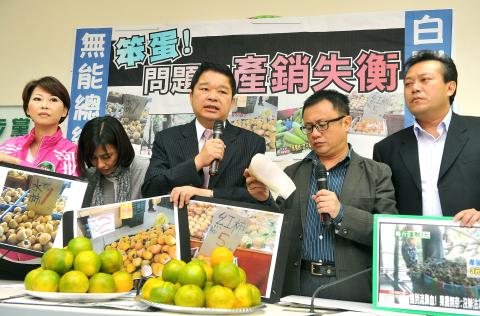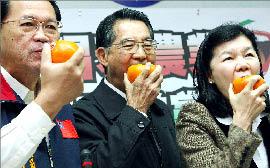The real problem with the nation’s agricultural sector is an imbalance between supply and demand and the government’s inability to resolve the matter, the Democratic Progressive Party (DPP) said yesterday amid a growing war of words between political parties over the price of persimmons.
“It’s the supply and demand imbalance, stupid,” DPP spokesperson Kang Yu-cheng (康裕成) said during a press conference, playing off a phrase made famous by former US president Bill Clinton during his 1992 presidential campaign.
Kang’s remark was made in response to criticism by President Ma Ying-jeou (馬英九) over the DPP’s claims about falling fruit prices for farmers under his watch.

Photo: Chien Jung-fong, Taipei Times
In a campaign flyer printed in the format of a calendar, the DPP listed a dozen types of locally grown fruits that have plunged in price this year.
Ma, Council of Agriculture (COA) Minister Chen Wu-hsiung (陳武雄) and the Chinese Nationalist Party (KMT) subsequently said the DPP was citing incorrect information to mislead the public ahead of next year’s presidential and legislative elections.
According to the DDP, prices for guavas in Changhua, longans in Greater Taichung and Nantou, persimmons in Taitung as well as tangerines in Yunlin have all fallen.

Photo: CNA
Ma rejected the DPP’s claim, saying that during his presidential campaign trips he had seen non-astringent persimmons sold for NT$41.5 per 600g, not NT$2 per 600g as the DPP says.
“The real issue here is that fruit growers sell their produce at a cost that is far lower than the cost of production, not how much those fruits sell for in the markets,” Kang said.
Ma made a “serious mistake” by citing wholesale and retail prices, rather than local prices, which is the price that actually relates to farmers’ income, Kang said.
While the persimmons shown on the flyer were non-astringent persimmons, the DPP was trying to highlight that astringent persimmons were being sold to local wholesalers at very low prices, DPP spokesperson Lin Chun-hsien (林俊憲) said.
However, Lin said Ma had missed the main point of the flyer, which was that the selling price for Taiwan-grown fruit has been far less than their average production cost.
The DPP caucus called on Ma to tackle the supply imbalance problem immediately and adopt a “95 percent mechanism” in which the government would purchase farm produce at 95 percent of the production cost whenever the selling price fell below specific prices monitored by the government.
Fruit imports from China between January and last month showed a 71 percent increase in comparison with the same period last year, DPP Legislator Pan Men-an (潘孟安) said, adding that the drop in prices could be because of the Economic Cooperation Framework Agreement (ECFA) signed between Taiwan and China in June last year.
An “early harvest” list accompanying the ECFA includes a number of agricultural products from Taiwan.
Citing statistics compiled by the Council of Agricultural Affairs, DPP Legislator Chiu Yi-ying (邱議瑩) said Taiwan exported 1,585 tonnes of bananas last year, but the figure showed a considerable drop this year, plunging to 859 tonnes between January and last month.
The DPP is not alone in drawing attention to the issue of falling produce prices, Chiu said, as numerous media outlets have been reporting on the phenomenon since June.
About one in five farmers does not qualify for government subsidies for natural disaster compensation because of unreasonable regulations, Lai Kun-cheng (賴坤成), a legislator from Taitung County, said, adding that he suspected that COA officials have kept the truth from Ma.
On Thursday, DPP Legislator Chen Min-wen (陳明文) disclosed a delivery order he had obtained from a local fruit grower in Fanlu Township (番路), Chiayi County, which showed that various grades of persimmons were sold for NT$2, NT$6 and NT$7 per kilogram, or NT$1.2, NT$2.4 and NT$4.2 per 600g (the equivalent of one Taiwanese jin, a traditional unit of weight).
Chen Min-wen urged Ma and Chen Wu-hsiung to inspect local prices in southern and eastern parts of the country, saying that most DPP legislators came from counties with a large agricultural output and tended to have a better understanding of local agricultural development.
“What the Ma administration should do is listen and then solve the problem, instead of blasting the DPP,” Chen Min-wen said.
KMT lawmakers and legislative candidates called a press conference demanding Tsai apologize to farmers.
Johnny Chiang (江啟臣), a legislative candidate in Greater Taichung, tore apart the DPP’s calendar, saying that farmers were so angry they planned to throw persimmon at the DPP headquarters in protest.
Chen Wu-hsiung said the claim that persimmons sold for NT$2 per 600g had caused farmers losses.
“It peeves me that the DPP didn’t bother to check the prices before it blamed others,” he said.
A persimmon farmer from Greater Taichung said that he was a victim of the DPP’s claim because his wholesalers decided to cancel all orders for fear of being overcharged.
“Non-astringent persimmons were never sold for less than NT$50 a jin, even while they were in season. After the DPP claimed that the price was NT$2 a jin, all my orders were canceled,” he said.
Hsu Kuei-kuang (徐貴光) said the picture of the persimmon, a Japanese variety named Maekawa Jiro, featured by the DPP was priced at more than NT$50 per 600g.
At a separate setting, Miaoli County Commissioner Liu Cheng-hung (劉政鴻) and some farmers called a press conference saying they would mobilize their peers to stage a protest in Taipei if Tsai failed to apologize within three days.
“If there is a place where sweet [non-astringent] persimmons sell for NT$2 a jin, I would like to buy 60 million grams at a price of NT$10 a jin,” Liu said.

INVESTIGATION: The case is the latest instance of a DPP figure being implicated in an espionage network accused of allegedly leaking information to Chinese intelligence Democratic Progressive Party (DPP) member Ho Jen-chieh (何仁傑) was detained and held incommunicado yesterday on suspicion of spying for China during his tenure as assistant to then-minister of foreign affairs Joseph Wu (吳釗燮). The Taipei District Prosecutors’ Office said Ho was implicated during its investigation into alleged spying activities by former Presidential Office consultant Wu Shang-yu (吳尚雨). Prosecutors said there is reason to believe Ho breached the National Security Act (國家安全法) by leaking classified Ministry of Foreign Affairs information to Chinese intelligence. Following interrogation, prosecutors petitioned the Taipei District Court to detain Ho, citing concerns over potential collusion or tampering of evidence. The

NEGOTIATIONS: The US response to the countermeasures and plans Taiwan presented has been positive, including boosting procurement and investment, the president said Taiwan is included in the first group for trade negotiations with the US, President William Lai (賴清德) said yesterday, as he seeks to shield Taiwanese exporters from a 32 percent tariff. In Washington, US Trade Representative Jamieson Greer said in an interview on Fox News on Thursday that he would speak to his Taiwanese and Israeli counterparts yesterday about tariffs after holding a long discussion with the Vietnamese earlier. US President Donald Trump on Wednesday postponed punishing levies on multiple trade partners, including Taiwan, for three months after trillions of US dollars were wiped off global markets. He has maintained a 10 percent

TRADE: The premier pledged safeguards on ‘Made in Taiwan’ labeling, anti-dumping measures and stricter export controls to strengthen its position in trade talks Products labeled “made in Taiwan” must be genuinely made in Taiwan, Premier Cho Jung-tai (卓榮泰) said yesterday, vowing to enforce strict safeguards against “origin laundering” and initiate anti-dumping investigations to prevent China dumping its products in Taiwan. Cho made the remarks in a discussion session with representatives from industries in Kaohsiung. In response to the US government’s recent announcement of “reciprocal” tariffs on its trading partners, President William Lai (賴清德) and Cho last week began a series of consultations with industry leaders nationwide to gather feedback and address concerns. Taiwanese and US officials held a videoconference on Friday evening to discuss the

PERSONAL DATA: The implicated KMT members allegedly compiled their petitions by copying names from party lists without the consent of the people concerned Judicial authorities searched six locations yesterday and questioned six people, including one elderly Chinese Nationalist Party (KMT) member and five KMT Youth League associates, about alleged signature forgery and fraud relating to their recall efforts against two Democratic Progressive Party (DPP) legislators. After launching a probe into alleged signature forgery and related fraud in the KMT’s recall effort, prosecutors received a number of complaints, including about one petition that had 1,748 signatures of voters whose family members said they had already passed away, and also voters who said they did not approve the use of their name, Taipei Deputy Chief Prosecutor